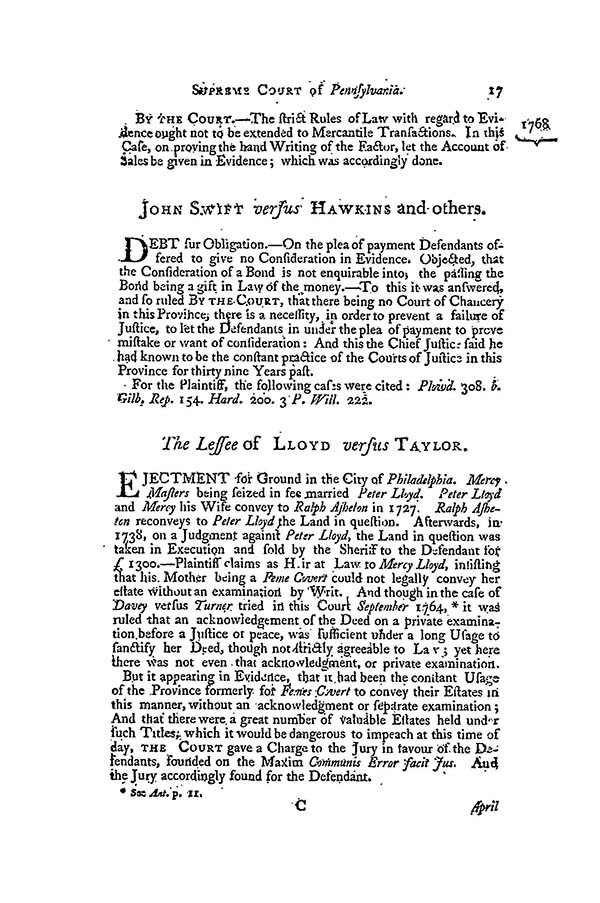Swift v. Hawkins, 1 Dall. 17 (Pa. 1768) and Lessee of Lloyd v. Taylor, 1 Dall. 17 (Pa. 1768)
Supreme Court of Pennsylvania
April Term, 1768.
John Swift versus Hawkins and others.
Debt sur Obligation.—On the plea of payment Defendants offered to give no Consideration in Evidence. Objected, that the Consideration of a Bond is not enquirable into, the passing the Bond being a gift in Law of the money.—To this it was answered, and so ruled By the Court, that there being no Court of Chancery in this Province; there is a necessity, in order to prevent a failure of Justice, to let the Defendants in under the plea of payment to prove mistake or want of consideration: And this the Chief Justice said he had known to be the constant practice of the Courts of Justice in this Province for thirty nine Years past.
For the Plaintiff, the following cases were cited: Plowd. 308. b. Gilb, Rep. 154. Hard. 200. 3 P. Will. 222.
Citation: Swift v. Hawkins, 1 U.S. 17, 1 Dall. 17 (Pa. 1768)
The Lessee of Lloyd versus Taylor
Ejectment for Ground in the City of Philadelphia. Mercy Masters being seized in fee married Peter Lloyd. Peter Lloyd and Mercy his Wife convey to Ralph Asheton in 1727. Ralph Asheton reconveys to Peter Lloyd the Land in question. Afterwards, in 1738, on a Judgment against Peter Lloyd, the Land in question was taken in Execution and sold by the Sheriff to the Defendant for £ 1300.—Plaintiff claims as Heir at Law to Mercy Lloyd, insisting that his Mother being a Feme Covert could not legally convey her estate without an examination by Writ. And though in the case of Davey versus Turner tried in this Court September 1764,* it was ruled that an acknowledgement of the Deed on a private examination before a Justice of peace, was sufficient under a long Usage to sanctify her Deed, though not strictly agreeable to Law; yet here there was not even that acknowledgment, or private examination.
But it appearing in Evidence, that it had been the constant Usage of the Province formerly for Femes Covert to convey their Estates in this manner, without an acknowledgment or separate examination; And that there were a great number of valuable Estates held under such Titles, which it would be dangerous to impeach at this time of day, the Court gave a Charge to the Jury in favour of the Defendants, founded on the Maxim Communis Error facit Jus. And the Jury accordingly found for the Defendant.
Citation: Lessee of Lloyd v. Taylor, 1 U.S. 17, 1 Dall. 17 (Pa. 1768)

Last modified: December 8, 2014